The transfer case is rigidly attached to the gearbox housing
The transfer case is driven by a gearbox differential box, on the outer splines of the body of which the drive shaft of the transfer case is installed
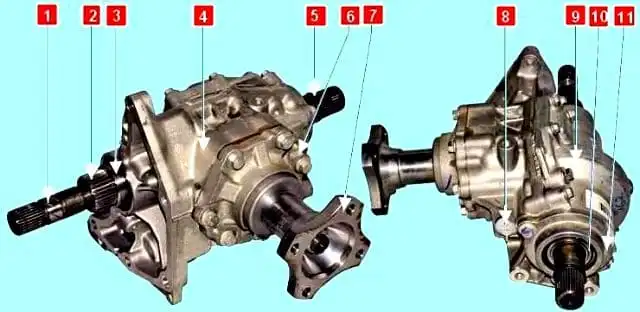
The transfer box is an angle gearbox with two bevel gears.
The main parts of the transfer case are the crankcase, the drive shaft, the cardan drive shaft (output shaft), the drive shaft that drives the right front wheel, the driving and driven bevel gears.
The transfer case housing is cast from aluminum alloy and has two vertical slots covered by front and rear covers.
The transfer box housing is attached to the clutch housing with three bolts and two nuts and is centered on two guide bushings pressed into the clutch housing.
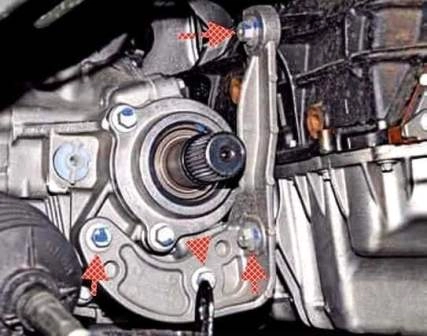
On the right side, the transfer case is attached with a bracket to the cylinder block and the engine oil pan.
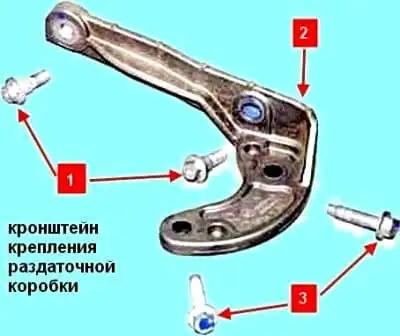
The bracket is attached to three parts at the same time in order to prevent its distortion when installing the transfer case and the appearance of internal stresses in it.
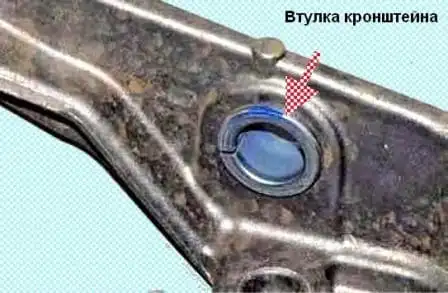
A floating split sleeve is installed in the hole for attaching the bracket to the engine oil pan.
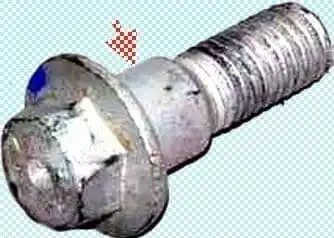
Special bolts with a centering band are used to fasten the bracket to the cylinder block and engine oil pan.
When installing the transfer case, the outer splines of the hollow drive shaft are connected to the splines of the differential box installed in the gearbox, and the splines of the right wheel drive are connected to the splines of the differential side gear.
Inside the transfer case, on the splines of the input shaft, a bevel drive gear of a hypoid gear is rigidly fixed, which is in constant engagement with the driven gear.
The driven gear is made in one piece with the cardan drive shaft and the output shaft.
A flange is put on the splines of this shaft, connecting the shaft with the flange of the cardan joint yoke, as a result of which the cardan shaft rotates constantly when the car is moving.
The thru-shaft is located inside the hollow drive shaft and is connected to the housing of the right wheel drive inner joint.
This connection is sealed with a rubber ring.
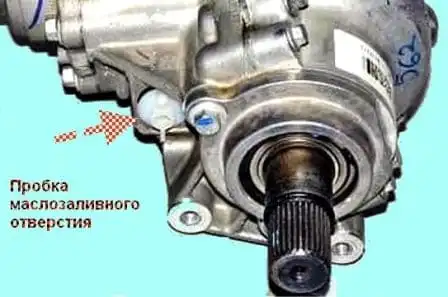
The transfer case is filled with transmission oil designed for the entire operation life.
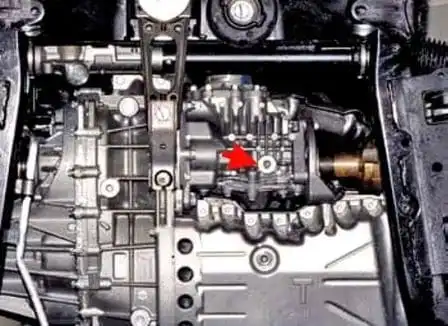
Sometimes the need to change the oil may arise when switching to a different viscosity of oil, when repairing the transfer case, or when removing the right wheel drive.
It is also necessary to change the oil after immersing the transfer case in water.
It is necessary to drain the oil after a trip, when the oil is warm.
Pour 0.9 liters of API GL5 SAE75W-90 gear oil into the transfer case.
The oil level should be at the edge of the control hole or slightly lower (you can reach the surface of the oil with your finger).
If the level is too low, add oil with a syringe.
Possible malfunctions of the transfer case and solutions
- Cause of malfunction
Remedy
Noise when driving:
- Loose fastening of the transfer case to the gearbox housing and to the engine oil sump
Tighten fasteners or replace supports
- Wear or damage to gears and bearings
Repair the transfer case
- Wrong grade oil filled
Fill in conditioning oil
- Insufficient oil level
Top up the oil to the correct level
Oil leak:
- Destruction, damage to oil seals
Replace oil seals





